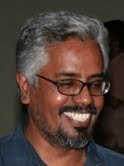Sudevan – Filmmaker in Our Attic

Sudevan, whose film ‘Thattumpurathappan’ (Lord of the Attic) was in the competition section for short films in the recently concluded International Short and Documentary Film Festival of Kerala, is the most unconventional of filmmakers to emerge in the video scene in Kerala. He is from a remote village in Palakkad district, and never had any exposure to film ‘classics’, film societies or film festivals. The first film festival he attended was the one which showed his first video! He has been making small video films at regular intervals for the last six years, all of which were noted for their deceptively simple visual treatment and sharp thematic focus. In a way, he is one of those rare organic filmmakers who is firmly rooted in his milieu and surroundings, and weaves his narratives from them. Shorn of all technical fineries, his films are very much visceral and have a captivating intimacy to them. More importantly, he believes in ‘real audience’: he would like to know and converse with them all at a personal level. For instance, more than 1000 DVD copies of his last film – Thattumporathappan - have been sold during the course of one year, which is an indicator of the success of the film. It is also the natural outcome of Sudevan’s relentless commitment to marketing his film, most of which has happened through word of mouth of his own audience.
Till date he has only made four films, all of which were made in association with Achuthanandan, his actor and alter ego, neighbour and producer, all rolled into one. He works with a very limited crew, and uses only the most essential low-end equipments, for want of money and fear of paraphernalia. But he makes elaborate preparations before each film: he develops the story line discussing the film threadbare with Achuthanandan, charts out camera angles and movements, and identifies all the locations. Finally, they garner all the local support and infrastructure for productioon, and do detailed and repeated rehearsals before the actual shooting. ‘I would place my camera and plan its movements in such a way that I perfectly know how it will look at the editing table’. Their post-production work does not end with editing and mixing, but with a detailed plan as to where to show the films and how to reach their target audience.
His first video ‘Varoo’ (2004) is a Kafkaesque take on the theme of ‘finding one’s own way’. Shot with an ordinary videocam by an amateur girl, who was the only person they knew who happened to possess a camera, it charmingly captures the winding country paths and the verdant terrain in all its seeming simplicity and labyrinthine dimensions. In his next film ‘Planning’ (2006), he looks at the flip side of Malayalee middle class family from the point of view of two thieves, who make detailed plans to rob a house when its occupants are away. Eventually, when they sneak their way into the house, they only find a letter which announces the decision of the house owner to put an end to his life and lists out his mounting woes and debts. ‘Randu’ (2008, Two) deals with a very fundamental theme of selfishness, and how it can crop up even in the most unlikely of circumstances. It is about two labourers who are digging a well; one among them chances upon a treasure, which turns out to be the fatal moment where they, who were one in their labour and life, become ‘two’ – each monstrously following his own greedy dream.
His latest film Lord of Attic (2010) takes a bleak but hilarious look at the whole phenomenon of spirituality business that is thriving in India today. Here is a young man, who while running away from the police, takes refuge in the attic of a house, and gradually works his way out by assuming the role of god and using the gullible devotee living below. In the end, we find that the same house turns out to be the hottest spiritual destination in the locality. What makes the film interesting is the way in which Sudevan works through the tenuous and almost uncanny relationship between god and devotee, both dependent on each other, and yearning for ‘liberation’.
Interestingly, in all his film till date, Sudevan has worked with a duo at the centre – seeker of the path and the one who shows it (Varoo), the two thieves (Planning), the manual labourers (Two), and the ‘god’ and devotee (Thattumporathappan). Having gained enough experience and confidence, he is planning to venture out to work on a larger canvas and format.
Taking around and showing his films in all possible venues, Sudevan has already assiduously built a network of Malayalee audiences across the world. But he would like to avoid the mistake of the hero of his first film and would like to find a way of his own, without falling for the lure of empty offers and trodden paths.


